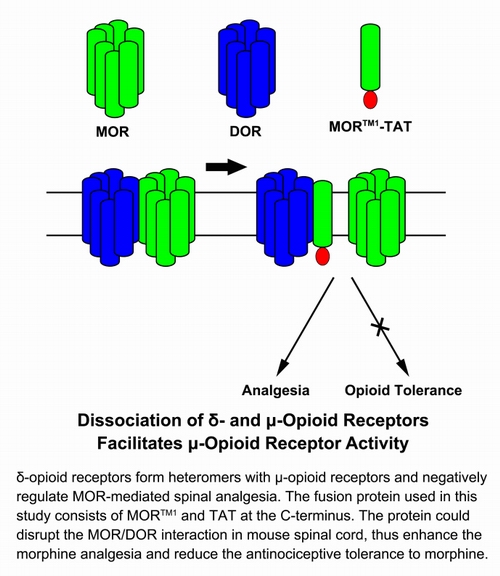Time:2011-01-13
On Jan. 13th, Neuron published a research article entitled "Facilitation of μ-opioid receptor activity by preventing δ-opioid receptor-mediated co-degradation". This work was carried out by graduate students Shao-Qiu He and Ji-Song Guan from Dr. Xu Zhang's laboratory at the Institution of Neuroscience, in close collaboration with graduate student Zhen-Ning Zhang from Dr. Lan Bao's laboratory at the Institute of Biochemistry and Cell Biology.
δ-opioid receptors (DORs) form heteromers with μ-opioid receptors (MORs) and negatively regulate MOR-mediated spinal analgesia. However, the underlying mechanism remains largely unknown. In this paper, Shao-Qiu He and colleagues found that the activity of MORs could be enhanced by preventing MORs from DOR-mediated co-degradation. Following selective DOR agonist stimulation, MORs and DORs on the cell surface were simultaneously internalized and processed for degradation in the lysosome. Such effects were attenuated by co-expression of an interfering peptide containing the first transmembrane domain of MOR (MORTM1), which interacted with DORs and disrupted the MOR/DOR interaction. Furthermore, the application of fusion protein consisting of MORTM1 and TAT at the C-terminus systemically could disrupt the MOR/DOR interaction in the mouse spinal cord, enhance morphine analgesia and reduce morphine tolerance. These results indicate that DOR agonist-induced co-internalization and co-degradation of DORs and MORs is responsible for MOR desensitization. These findings provide a potential strategy to dissociate MORs from DORs in vivo to improve opioid analgesic therapies.

This work was supported by the grants from the Chinese Academy of Sciences, the Ministry of Science and Technology and the National Natural Science Foundation of China.
 附件下载:
附件下载: